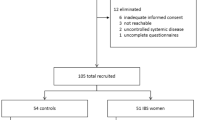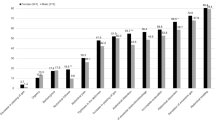Abstract
Background
Due to the sex differences in physiological and psychological factors, it can be speculated that clinical presentation of symptoms in male and female patients with irritable bowel syndrome (IBS) might be different.
Aim
To evaluate sex-related differences in clinical symptoms, quality of life, and biochemical factors in IBS.
Methods
Ninety IBS patients (29 men, 61 women (45 premenopausal, 16 postmenopausal)) were recruited from the outpatient clinic of the University Hospital. All the patients met the Rome III Diagnostic Criteria. The IBS severity score system (IBS-SSS), gastrointestinal (GI) symptoms, IBS specific quality of life (IBS-QoL), and biochemical factors (IL-17, IL-10, TNFα, malondialdehyde (MDA), total antioxidant capacity (TAC)) were assessed.
Results
Diarrhea predominant IBS (IBS-D) was more common in men (44.8%), whereas constipation-predominant IBS (IBS-C) and alternating bowel habits IBS (IBS-A) were more common in women (39.3, 42.6%, respectively). The women had a greater severity of abdominal distention, rumbling, flatulence, and dissatisfaction with bowel habits as compared with men. The scores of IBS-QoL in women were significantly (P < 0.05) lower than those in men. Moreover, pro-inflammatory cytokines (IL-17, TNFα) increased, and anti-inflammatory cytokine (IL-10) decreased in women versus men. In addition, there was no significant difference (P > 0.05) between pre- and postmenopausal women in the severity of symptoms. All of the GI symptoms and IBS-SSS have a significant negative correlation with IBS-QoL in both men and women.
Conclusions
Female with IBS reports a greater severity of IBS symptoms, increased inflammatory cytokines, and has an impaired quality of life compared with male.





Similar content being viewed by others
Abbreviations
- IBS:
-
Irritable bowel syndrome
- QoL:
-
Quality of life
- IBS-SSS:
-
IBS severity-scoring system
- IBS-QoL:
-
IBS-specific QoL
- GI:
-
Gastrointestinal
- IBS-D:
-
Diarrhea-predominant
- IBS-C:
-
Constipation-predominant
- IBS-A:
-
Alternating bowel habits
- TNFα:
-
Tumor necrosis factor α
- IL-10:
-
Interleukin 10
- IL-17:
-
Interleukin 17
- SD:
-
Standard deviation
- VAS:
-
Visual analog scale
References
Lee K, Rhee P, Kim J, et al. Assessment of autonomic tone over a 24-hour period in patients with irritable bowel. Gastroenterology. 1997;112:A773–A773.
Drossman DA, Whitehead WE, Camilleri M. Irritable bowel syndrome: a technical review for practice guideline development. Gastroenterology. 1997;112:2120–2137.
Talley NJ. Diagnosing an irritable bowel: does sex matter? Gastroenterology. 1991;100:834–837.
Lee OY, Mayer EA, Schmulson M, Chang L, Naliboff B. Gender-related differences in IBS symptoms. Am J Gastroenterol. 2001;96:2184–2193.
Tang Y, Yang W, Wang Y, Lin L. Sex differences in the symptoms and psychological factors that influence quality of life in patients with irritable bowel syndrome. Eur J Gastroenterol Hepatol. 2012;24:702–707.
Camilleri M, Mayer E, Drossman D, et al. Improvement in pain and bowel function in female irritable bowel patients with alosetron, a 5-HT. Aliment Pharmacol Ther. 1999;13:1149–1159.
Müller-Lissner S, Fumagalli I, Bardhan K, et al. Tegaserod, a 5-HT4 receptor partial agonist, relieves symptoms in irritable bowel syndrome patients with abdominal pain, bloating and constipation. Aliment Pharmacol Ther. 2001;15:1655–1666.
Simren M, Abrahamsson H, Svedlund J, Björnsson E. Quality of life in patients with irritable bowel syndrome seen in referral centers versus primary care: the impact of gender and predominant bowel pattern. Scand J Gastroenterol. 2001;36:545–552.
Chang L, Heitkemper MM. Gender differences in irritable bowel syndrome. Gastroenterology. 2002;123:1686–1701.
Mayer EA, Naliboff BD, Chang L, Coutinho SVV. Stress and irritable bowel syndrome. American Journal of Physiology-Gastrointestinal and Liver Physiology. 2001;280:G519–G524.
Dinan TG, Quigley EM, Ahmed SM, et al. Hypothalamic-pituitary-gut axis dysregulation in irritable bowel syndrome: plasma cytokines as a potential biomarker? Gastroenterology. 2006;130:304–311.
Kirschbaum C, Kudielka BM, Gaab J, Schommer NC, Hellhammer DH. Impact of gender, menstrual cycle phase, and oral contraceptives on the activity of the hypothalamus-pituitary-adrenal axis. Psychosom Med. 1999;61:154–162.
Fukudo S, Nomura T, Hongo M. Impact of corticotropin-releasing hormone on gastrointestinal motility and adrenocorticotropic hormone in normal controls and patients with irritable bowel syndrome. Gut. 1998;42:845–849.
Turnbull AV, Rivier CL. Regulation of the hypothalamic–pituitary–adrenal axis by cytokines: actions and mechanisms of action. Physiol Rev. 1999;79:1–71.
Scully P, McKernan DP, Keohane J, et al. Plasma cytokine profiles in females with irritable bowel syndrome and extra-intestinal co-morbidity. Am J Gastroenterol. 2010;105:2235–2243.
Liebregts T, Adam B, Bredack C, et al. Immune activation in patients with irritable bowel syndrome. Gastroenterology. 2007;132:913–920.
Gonsalkorale W, Perrey C, Pravica V, Whorwell P, Hutchinson I. Interleukin 10 genotypes in irritable bowel syndrome: evidence for an inflammatory component? Gut. 2003;52:91–93.
Schröder J, Kahlke V, Staubach K-H, Zabel P, Stüber F. Gender differences in human sepsis. Arch Surg. 1998;133:1200–1205.
Vgontzas AN, Zoumakis E, Bixler EO, et al. Adverse effects of modest sleep restriction on sleepiness, performance, and inflammatory cytokines. J Clin Endocrinol Metab. 2004;89:2119–2126.
Viña J, Sastre J, Pallardó F, Borrás C. Mitochondrial theory of aging: importance to explain why females live longer than males. Antioxid Redox Sig. 2003;5:549–556.
Nielsen F, Mikkelsen BB, Nielsen JB, Andersen HR, Grandjean P. Plasma malondialdehyde as biomarker for oxidative stress: reference interval and effects of life-style factors. Clin Chem. 1997;43:1209–1214.
Whitehead WE, Cheskin LJ, Heller BR, et al. Evidence for exacerbation of irritable bowel syndrome during menses. Gastroenterology. 1990;98:1485–1489.
Abbasnezhad A, Amani R, Hajiani E, Alavinejad P, Cheraghian B, Ghadiri A. Effect of vitamin D on gastrointestinal symptoms and health-related quality of life in irritable bowel syndrome patients: a randomized double-blind clinical trial. Neurogastroenterol Motil. 2016.
Rome F. Guidelines–Rome III diagnostic criteria for functional gastrointestinal disorders. J Gastrointest Liver Dis. 2006;15:307.
Francis C, Morris J, Whorwell P. The irritable bowel severity scoring system: a simple method of monitoring irritable bowel syndrome and its progress. Aliment Pharmacol Ther. 1997;11:395–402.
Drossman DA, Patrick DL, Whitehead WE, et al. Further validation of the IBS-QOL: a disease-specific quality-of-life questionnaire. Am J Gastroenterol. 2000;95:999–1007.
Botsoglou NA, Fletouris DJ, Papageorgiou GE, Vassilopoulos VN, Mantis AJ, Trakatellis AG. Rapid, sensitive, and specific thiobarbituric acid method for measuring lipid peroxidation in animal tissue, food, and feedstuff samples. J Agric Food Chem. 1994;42:1931–1937.
Benzie IF, Strain J. The ferric reducing ability of plasma (FRAP) as a measure of “antioxidant power”: the FRAP assay. Anal Biochem. 1996;239:70–76.
Corney RH, Stanton R. Physical symptom severity, psychological and social dysfunction in a series of outpatients with irritable bowel syndrome. J Psychosom Res. 1990;34:483–491.
Chen T-S, Doong M-L, Chang F-Y, Lee S-D, Wang PS. Effects of sex steroid hormones on gastric emptying and gastrointestinal transit in rats. Am J Physiol Gastrointest Liver Physiol. 1995;268:G171–G176.
Giamberardino MA, Affaitati G, Valente R, Iezzi S, Vecchiet L. Changes in visceral pain reactivity as a function of estrous cycle in female rats with artificial ureteral calculosis. Brain Res. 1997;774:234–238.
Blanchard EB, Keefer L, Galovski TE, Taylor AE, Turner SM. Gender differences in psychological distress among patients with irritable bowel syndrome. J Psychosom Res. 2001;50:271–275.
Park JM, Choi M-G, Kim YS, et al. Quality of life of patients with irritable bowel syndrome in Korea. Qual Life Res. 2009;18:435–446.
Spiller R, Aziz Q, Creed F, et al. Guidelines on the irritable bowel syndrome: mechanisms and practical management. Gut. 2007;56:1770–1798.
Weinryb R, Österberg E, Blomquist L, Hultcrantz R, Krakau I, Åsberg M. Psychological factors in irritable bowel syndrome: a population-based study of patients, non-patients and controls. Scand J Gastroenterol. 2003;38:503–510.
Raison CL, Capuron L, Miller AH. Cytokines sing the blues: inflammation and the pathogenesis of depression. Trends Immunol. 2006;27:24–31.
Guthrie E, Barlow J, Fernandes L, et al. Changes in tolerance to rectal distension correlate with changes in psychological state in patients with severe irritable bowel syndrome. Psychosom Med. 2004;66:578–582.
Andrae DA, Patrick DL, Drossman DA, Covington PS. Evaluation of the Irritable Bowel Syndrome Quality of Life (IBS-QOL) questionnaire in diarrheal-predominant irritable bowel syndrome patients. Health Qual Life Outcomes. 2013;11:1.
Bashashati M, Rezaei N, Shafieyoun A, et al. Cytokine imbalance in irritable bowel syndrome: a systematic review and meta-analysis. Neurogastroenterol Motil. 2014;26:1036–1048.
Triadafilopoulos G, Finlayson MA, Grellet C. Bowel dysfunction in postmenopausal women. Women Health. 1998;27:55–66.
Acknowledgments
This work was financially supported by a Grant (No. NRC-9410) from the Vice-Chancellor for Research at the Jundishapur University of Medical Sciences and approved by the Nutrition and Metabolic Diseases Research Center, Jundishapur University of Medical Sciences, Ahvaz, Iran.
Author’s contribution
AA is the guarantor of the manuscript; AA, RA, and RC provided the overall concept and framework for the manuscript and is involved in the drafting and critical revision of the manuscript; MA served as the coordinating investigator; AA was responsible for the statistical analyses. All authors contributed to data interpretation, critically reviewed the manuscript, and approved the final version of the manuscript, including the authorship list.
Author information
Authors and Affiliations
Corresponding author
Ethics declarations
Conflict of interest
None of the authors reported a conflict of interest related to the study.
Rights and permissions
About this article
Cite this article
Choghakhori, R., Abbasnezhad, A., Amani, R. et al. Sex-Related Differences in Clinical Symptoms, Quality of Life, and Biochemical Factors in Irritable Bowel Syndrome. Dig Dis Sci 62, 1550–1560 (2017). https://doi.org/10.1007/s10620-017-4554-6
Received:
Accepted:
Published:
Issue Date:
DOI: https://doi.org/10.1007/s10620-017-4554-6




